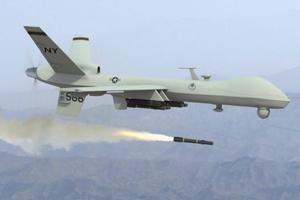TerrorismAre Americans safer today than they were four years ago?
The presidential campaign is dominated by economic issues, so the question the two candidates invite their audience to ponder is: “Are you better off now than four years ago?”; the question “Are you safer today than you were four years ago” is hardly, if ever, posed; security experts agree that while security challenges posed by China, Iran, and Islamists in Africa have grown, Americans are safer today than they were four years ago because the Obama administration, relative to its predecessor and, has pursued the campaign against terrorism and terrorists more aggressively and more single-mindedly; sustained drone strikes and secretive special operations have weakened al Qaeda considerably over the last four years

U.S. drone firing a Hellfire missile // Source: presstv.ir
With the election coming up soon, the debate over whether the United States is safe has taken a back seat to other issues, such as the economy, but the question still remains: is the country safer now than it was four years ago?
Security experts say that for the most part the answer is yes. After 9/11 government agencies have done a much better job communicating and making a consolidated effort to stop terrorist attacks. Airport security has now become a nuisance, but most people accept it, knowing they will be safe in the skies.
The combined work of the military, financial efforts to hurt al Qaeda, and the killing of many terrorist leaders, including Osama bin Laden, have given Americans a reason to sleep easier.
The Washington Post reports that since Barack Obama was elected president, the United States has pursued a more aggressive UAV campaign against militants in Afghanistan, Pakistan, Yemen, and Somalia; increased defense cooperation with countries like Israel and the Philippines; pressured other nations to increased their own defense spending; pulled U.S. forces out of Iraq; and set in motion the withdrawal of American troops from Afghanistan.
The Post says that the success of these efforts, coupled with the troubled economy, have led to other issues being dominant in the election campaign. The Post notes that Mitt Romney, in his speech at the Republican National Convention, made no reference to any terrorist organization or terrorism in general.
Phil Mudd, a senior counterterrorism official at the CIA and FBI during the Bush and Obama administrations, thinks there is a significant decline in the threat of a terrorist attack. “I would have said four years ago that the al-Qaida movement was emerging as a bigger problem, especially with the emergence of affiliates in places like Yemen and with the spike in homegrown attacks,” Mudd told the Washington Post. “But I would say today that al-Qaidaism is on the decline. By any balance, the number of places where people want to come after us has declined in the past four years.”
Militants in other countries are still causing problems in their own areas, but according to Mudd, those groups are now less likely to “be sitting there saying how do we get to Los Angeles, and that’s a big change.”
The absence of foreign terrorism in the United States does not mean that the United States is not facing considerable security challenges. Efforts to dissuade Iran from developing nuclear weapons have not worked so far, and as Israel’s anxiety about a nuclear Iran grows, the possibility of a U.S. involvement in an attack on Iran – with or without Israel — is becoming more of an issue.
Senator John McCain said at the Republican convention that Obama missed an opportunity by not supporting an anti-regime revolution in Iran.
“For four years, we’ve drifted away from our proudest traditions of global leadership,” said McCain at the Republican convention. “We are now being tested by an array of threats that are more complex, more numerous and just as deeply and deadly as I can recall in my lifetime.”
Supporters of Obama have praised him for calming tensions in Russia and China, as well as other countries that were skeptical of the American invasion of Iraq. “Everyone was afraid that Iraq meant that whenever we thought it was a good idea to bring democracy to a country by force we would do it,” said James Lewis, a Washington-based national security expert, now with the Center for Strategic and International Studies. Through diplomatic efforts by the Obama administration, he said that “that level of fear has been tamped down. The global perception of the U.S. is better.”
The country’s relationship with China is growing more tense over China’s growing military and cyber activities, and its more confrontational approach to territorial disputes with its neighbors. Romney, in his speeches, often accuses China of currency manipulation and promises that one of his first acts as president would be to call China on it.
“We have strengthened our alliances around the world to protect against future threats, locked down nuclear materials and improved our homeland defenses,” Tommy Vietor, spokesman for the National Security Council told the Post. “The U.S. is absolutely safer now than four years ago.”
